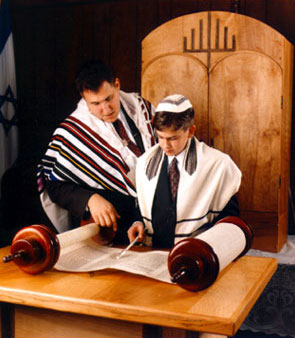Judaism Rituals
Bar Mitzvah
- The initiation ceremony of a Jewish boy who has reached 13 years old and is highly regarded as ready to observe religious precepts and now eligible to take part in public worship.
- The process of becoming a Bar Mitzvah is a very long one where the young man must master all sorts of specific prayers to recite at his ceremony and lead the service. Prayers such as; V'Havta, Yotzer, S'hma, G'vurot, and so on.
- Each young man is also assigned a specific passage in one of the Five Books of Moses in the Torah based on the month their Bar Mitzvah takes place.
- They need to memorize the words and different chants of their passage in the Torah for their Bar Mitzvah day. They study the passage with vowels under the letters, but no vowels will be under the letters in the Torah.
- As the young man becomes a Bar Mitzvah, they are held accountable for all of their actions and become a man. In celebration, the parents of the Bar Mitzvah throw them a big celebration while inviting all of their family and close friends to the occasion.


Rosh Hashanah
- Literally means "head of the year" in Hebrew. Rosh Hashanah is the celebration of the new year on the Jewish calendar.
- It occurs on the first and second days of the seventh month of the Jewish year. The Jewish New Year is a time to begin introspection, looking back at the mistakes of the past year and planning the changes to make in the new year.
- The name "Rosh Hashanah" is not used in the Bible to discuss this holiday. The Bible refers to the holiday as Yom Ha-Zikkaron (the day of remembrance) or Yom Teruah (the day of the sounding of the shofar). The holiday is instituted in Leviticus 23:24-25.
- The shofar is a ram's horn which is blown somewhat like a trumpet. One of the most important observances of this holiday is hearing the sounding of the shofar in the synagogue, which wakes up our souls.
- Another popular practice of the holiday is Tashlikh ("casting off"). Jews walk to flowing water, such as a creek or river, on the afternoon of the first day and empty their pockets into the river, symbolically casting off their sins. Small pieces of bread are commonly put in the pocket to cast off.
- Another popular tradition is dipping and eating apples and honey in wishes for a "sweet new year."




You have sound knowledge and understanding of the two rituals. However, make sure that these posts are more analytical than descriptive.
ReplyDeleteWhere are your key concepts?
ReplyDelete